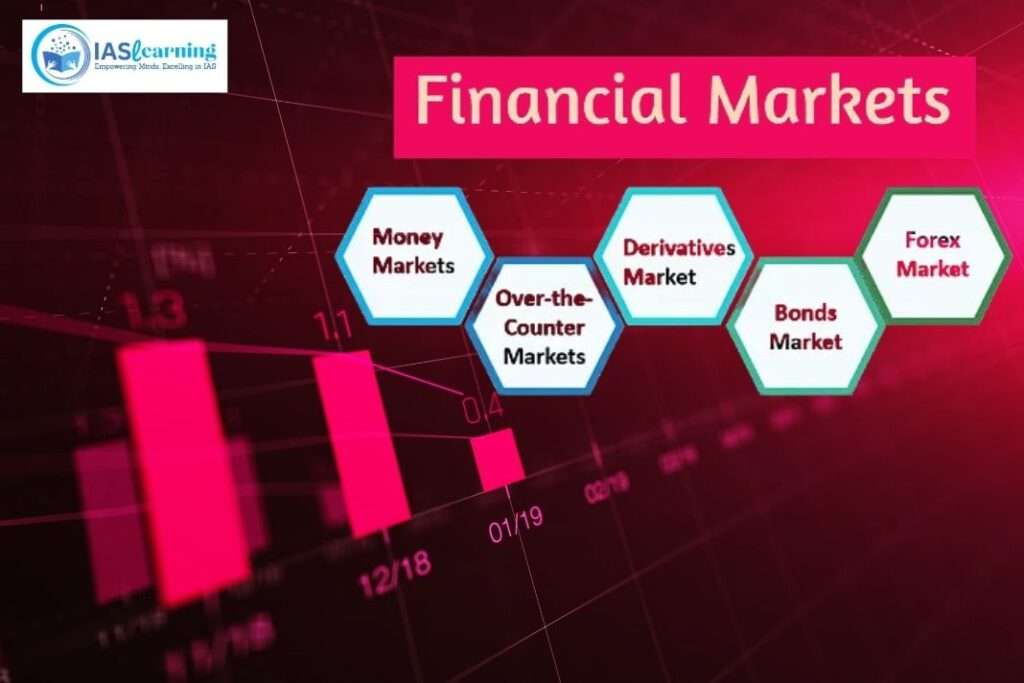Table of Contents
In the fast-paced world of finance, navigating the complexities of the financial market is both a challenge and an opportunity. From stocks and bonds to commodities and forex, the financial market plays a pivotal role in the global economy. In this comprehensive guide, we will explore the intricacies of the financial market, providing insights for beginners and seasoned investors alike.
Introduction to Financial Markets
Financial markets are the backbone of the global economy. They are platforms where individuals, corporations, and governments buy and sell financial instruments such as stocks, bonds, commodities, and currencies. These markets facilitate the flow of capital, enabling businesses to raise funds, investors to grow wealth, and governments to manage their finances.
Types of Financial Markets

Equity Market
The equity market, also known as the stock market, is where shares of publicly-traded companies are bought and sold. Investors purchase shares to become partial owners of these companies, aiming for capital appreciation and dividends.
Fixed-Income Market
The fixed-income market deals with bonds, which are debt securities issued by governments and corporations. Investors lend money to these entities in exchange for periodic interest payments and the return of their principal at maturity.
Commodities Market
Commodities markets handle the trading of physical goods like gold, oil, and agricultural products. These markets are essential for price discovery and hedging against price fluctuations.
Foreign Exchange Market
The foreign exchange market, or forex, is where currencies are traded. It’s the largest financial market globally, with participants ranging from central banks to individual traders.
Key Players in the Financial Market
Understanding who participates in the financial market is crucial.
Market Participants
Retail Investors
Retail investors are individual investors who trade in relatively small quantities. They play an increasingly significant role in the financial market, thanks to online trading platforms.
Institutional Investors
Institutional investors are entities like mutual funds, pension funds, and insurance companies that manage large pools of capital on behalf of many investors.
Market Makers
Market makers are financial firms that provide liquidity by facilitating trading. They buy and sell securities to ensure there is always a market for them.
How Financial Markets Function

Financial markets are the backbone of the global economy, facilitating the exchange of funds and assets among various participants. Understanding how these markets function is crucial for investors, policymakers, and anyone interested in the world of finance. In this article, we will explore the fundamental principles that govern the operation of financial markets.
Supply and Demand
At its core, the functioning of financial markets is driven by the basic economic principles of supply and demand. These markets provide a platform where buyers and sellers come together to exchange financial assets, including stocks, bonds, commodities, and currencies. The prices of these assets are determined by the forces of supply and demand.
When there is high demand for a particular asset, its price tends to rise, and when supply outstrips demand, the price falls. This price discovery process is continuous and occurs in real-time as market participants react to news, economic data, and geopolitical events.
Market Participants
Financial markets are populated by a diverse group of participants, each with unique roles and motivations. Here are some of the key market participants:
Retail Investors: These are individual investors who participate in financial markets, often through brokerage accounts. Retail investors buy and sell financial assets with the goal of growing their wealth over time.
Institutional Investors: Large institutions like mutual funds, pension funds, and insurance companies manage substantial pools of capital on behalf of many investors. They have significant influence in the market due to their size.
Market Makers:Market makers are financial firms that facilitate trading by providing liquidity. They buy and sell securities, ensuring that there is always a market for them. This helps maintain smooth and efficient trading.
Banks and Financial Institutions: Banks play multiple roles in financial markets. They act as intermediaries, providing services such as lending, underwriting, and asset management. Central banks, in particular, have a critical role in setting interest rates and managing monetary policy.
Hedge Funds: Hedge funds are investment funds that use various strategies to generate returns for their investors. They often have more flexibility and can employ complex trading strategies.

Market Orders and Trading Strategies
When participants wish to buy or sell financial assets, they use different types of orders and trading strategies to execute their transactions. Here are some common ones:
Market Orders: These orders are executed immediately at the current market price. They are suitable for investors who prioritize speed over price.
Limit Orders: With limit orders, investors specify a target price at which they want to buy or sell an asset. These orders may not execute if the market doesn’t reach the specified price.
Stop Orders: Stop orders are designed to limit losses or protect profits. They become market orders when a predetermined price level is reached.
Role of Exchanges
Most financial assets are traded on organized exchanges, such as stock exchanges or commodities exchanges. These exchanges provide a centralized marketplace where buyers and sellers can interact. They also establish rules and regulations to ensure fair and transparent trading.
Market Indices
Market indices, such as the S&P 500 or Dow Jones Industrial Average, serve as benchmarks to track the performance of specific segments of the financial market. These indices aggregate the prices of selected assets to provide a snapshot of overall market health.
Market Hours
Financial markets operate during specific hours, which vary depending on the asset class and the exchange. For example, stock markets typically have regular trading hours during the business day, while the forex market operates 24 hours a day, five days a week, due to its global nature.
Volatility in the Financial Market

Financial markets can be highly volatile, with prices fluctuating rapidly. Understanding and managing volatility is crucial for investors.
The Role of Central Banks
Central banks play a pivotal role in the financial market by setting interest rates, controlling money supply, and ensuring economic stability.
Economic Indicators and Their Impact
What Are Economic Indicators?
Economic indicators are statistical data points that provide information about various aspects of an economy. They are typically released by government agencies, central banks, and private organizations on a regular basis. Investors, policymakers, and analysts closely monitor these indicators to gauge economic performance and make informed decisions.
Key Economic Indicators
There are numerous economic indicators, each shedding light on different facets of the economy. Here are some of the most closely watched indicators and their impact on financial markets:
Gross Domestic Product (GDP):
- Impact: GDP measures the total value of goods and services produced within a country. A strong GDP growth rate is generally seen as a sign of a healthy economy, leading to optimism among investors. Conversely, a declining GDP growth rate can lead to market concerns.
Unemployment Rate:
- Impact: The unemployment rate reflects the percentage of the labor force that is jobless and actively seeking employment. A rising unemployment rate can signal economic distress and negatively impact consumer spending and investor confidence.
Inflation Rate:
- Impact: Inflation measures the increase in the general price level of goods and services. Moderate inflation is typically viewed as a sign of a healthy economy. However, high or accelerating inflation can erode purchasing power and lead to uncertainty in financial markets.
Interest Rates:
- Impact: Central banks use interest rates to control borrowing costs and influence economic activity. Changes in interest rates can impact bond prices, stock valuations, and currency exchange rates. For example, higher interest rates can lead to lower stock prices.
Consumer Confidence Index:
- Impact: Consumer confidence reflects the optimism of consumers about the economy’s future. High consumer confidence can boost consumer spending and stimulate economic growth, positively impacting financial markets.
Business Confidence Index:
- Impact: Business confidence gauges the sentiment of business leaders. A positive business outlook can lead to increased investments, job creation, and stock market gains.
Trade Balance:
- Impact: The trade balance measures the difference between a country’s exports and imports. A trade surplus (exports > imports) can strengthen a country’s currency, while a trade deficit (imports > exports) can weaken it, affecting exchange rates and trade-related stocks.
Market Reaction to Economic Indicators
Financial markets react swiftly to the release of economic indicators, often resulting in immediate price movements. Traders and investors analyze the data relative to expectations, which are often provided by economists and analysts.
- Meet Expectations: If an economic indicator meets or exceeds expectations, it can boost investor confidence and lead to positive market reactions. For example, a strong GDP growth figure can lead to stock market gains.
- Miss Expectations: Conversely, if an indicator falls short of expectations, it can lead to market uncertainty and negative reactions. For instance, higher-than-expected unemployment rates can lead to declines in equity markets.
- Surprise Factor: Sometimes, economic indicators can surprise the market by deviating significantly from forecasts. Such surprises can lead to sharp and unpredictable market moves, highlighting the importance of staying informed.
Risk Management in the Financial Market
Effective risk management is essential for protecting investments. Diversification and hedging strategies can mitigate potential losses.
The Psychology of Trading
Emotions often drive trading decisions. Successful investors learn to manage their emotions and make rational choices.
The Evolution of Financial Markets
Financial markets have evolved over centuries, adapting to changing economic conditions and technological advancements.
Globalization and the Financial Market
Globalization has interconnected financial markets worldwide, making them more accessible and susceptible to global events.
Technological Advancements
The financial market has undergone a remarkable transformation in recent years, largely driven by technological advancements. These innovations have not only changed the way financial institutions operate but have also opened up new opportunities for investors and traders. In this article, we will explore some of the key technological advancements that have reshaped the financial market landscape.
Algorithmic Trading
Algorithmic trading, often referred to as algo-trading or simply “algos,” is a technology-driven approach to trading that uses complex algorithms to execute trades at high speeds and frequencies. These algorithms analyze market data, identify trading opportunities, and execute orders without human intervention. The speed and precision of algo-trading have significantly increased market liquidity and efficiency.
High-Frequency Trading (HFT)
High-frequency trading is a subset of algorithmic trading that involves executing a large number of orders in fractions of a second. HFT firms leverage cutting-edge technology and low-latency connections to gain a competitive edge. While HFT has sparked debates about market stability, it has undeniably added liquidity to financial markets.
Electronic Trading Platforms
The transition from traditional floor trading to electronic trading platforms has been a game-changer in the financial market. Traders can now buy and sell financial instruments with the click of a button, thanks to online trading platforms. These platforms offer real-time data, advanced charting tools, and seamless order execution.
Big Data Analytics
The financial market generates an enormous amount of data daily. Big data analytics technologies allow financial institutions to process and analyze this data to gain insights into market trends, risk management, and customer behavior. Predictive analytics, in particular, helps in making data-driven investment decisions.
Artificial Intelligence (AI) and Machine Learning
AI and machine learning have found widespread applications in the financial market. These technologies are used for fraud detection, credit scoring, robo-advisors, and even predicting market movements. Machine learning algorithms analyze historical data to identify patterns and make predictions with a high degree of accuracy.
Blockchain and Cryptocurrencies
Blockchain, the technology behind cryptocurrencies like Bitcoin, has the potential to disrupt traditional financial systems. It offers secure, transparent, and decentralized transactions, reducing the need for intermediaries like banks. Cryptocurrencies themselves have gained popularity as alternative assets and investment options.
RegTech (Regulatory Technology)
Regulatory compliance is a critical aspect of the financial market. RegTech solutions leverage technology to help financial institutions efficiently meet regulatory requirements. This includes monitoring transactions for suspicious activities, reporting, and ensuring data security.
Mobile Trading Apps
The rise of mobile trading apps has democratized access to financial markets. Investors can now trade on the go using smartphones and tablets. These apps offer real-time market data, portfolio management, and the convenience of trading from anywhere.
Cybersecurity Measures
With the increasing reliance on technology, cybersecurity has become a paramount concern. Financial institutions invest heavily in cybersecurity measures to protect customer data, financial assets, and the stability of the financial market itself.
Cloud Computing
Cloud computing has enabled financial institutions to scale their operations, reduce costs, and enhance data storage and processing capabilities. It offers flexibility and scalability, allowing firms to adapt to changing market conditions swiftly.
Conclusion
In conclusion, the financial market is a dynamic and multifaceted entity that influences the global economy. Understanding its various components, participants, and dynamics is essential for anyone looking to navigate this complex world effectively.
FAQs
1. How can I start investing in the financial market as a beginner?
- Begin by educating yourself about the different asset classes and investment strategies. Consider consulting a financial advisor.
2. What are the main risks associated with investing in the stock market?
- Stock market investments carry risks such as market volatility, company-specific risks, and economic downturns.
3. How do central banks influence interest rates, and how does it impact the financial market?
- Central banks influence interest rates through monetary policy, which can affect borrowing costs and investment decisions in the financial market.
4. What are some common mistakes to avoid when trading in the forex market?
- Common mistakes include overleveraging, lack of risk management, and emotional trading. It’s important to have a solid trading plan.
5. How has technology changed the landscape of financial markets?
- Technology has led to faster execution of trades, increased accessibility for retail investors, and innovations like cryptocurrencies.

